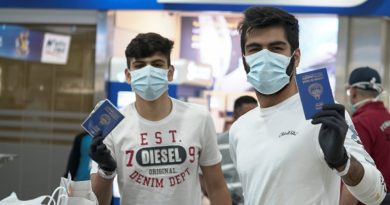Investigation of potential burial sites top priority for Williams Lake First Nation as prime minister visits
WARNING: This story contains details some readers may find distressing.
Prime Minister Justin Trudeau and Minister of Indigenous-Crown Relations Marc Miller are visiting the Williams Lake First Nation on Wednesday to discuss the nation’s recent findings at the site of a former residential school and to listen to survivors.
Led by Chief Willie Sellars, Trudeau and Miller arrived at the nation’s administration building for an official welcome ceremony just after 10:30 a.m. PT.
“It is an honour and a privilege for me to be welcomed by dummers, dancers, elders and Chief Willie Sellars and council. Minister Miller and I are deeply touched by this extraordinary welcome to your territory,” Trudeau said, addressing the room.
“I am moved to be here. I am here both to indicate that all of Canada grieves with this community at … the feelings of loss that have come since the discovery of the reflections, but also the deep loss this community has felt over generations because of the legacy of residential schools,” he added.
“I am mostly here to listen, to learn, to hear from elders and community members [on] what the path forward looks like —not just for this community, but for this country.”
In January, the Williams Lake First Nation announced that 93 sites of “potential human burials” were identified near the former St. Joseph’s Mission residential school. Only 14 out of 470 hectares of land had been searched at that time.
“We’re thankful that the prime minister is making the time to visit Williams Lake First Nation,” Chief Willie Sellars said in a statement ahead of the visit.

“This trip has been a long time in the making, and we have much to discuss about the St. Joseph’s Mission investigation, the Government of Canada’s role in residential school investigations, and Canada’s commitment to the goals of reconciliation.”
Miller said he’s been visiting other First Nations communities that have undertaken searches of former residential school grounds to hear from survivors.

“Certainly we’re going to find out about a lot more discoveries, and I don’t think Canada is emotionally ready for the next wave of discoveries that will inevitably be found,” he told CBC’s The Early Edition earlier Wednesday.
“It’s truth for Indigenous people … but also for the rest of the country that is perhaps not as aware as it should be about the reality of Canada.”
Tŝilhqot’in Nation declines invitation
Although members were invited to participate in the prime minister’s visit today, the Tŝilhqot’in Nation said it would not send representatives.
Tl’etinqox Chief Joe Alphonse said he’s repeatedly asked for a more inclusive and respectful approach to the site investigation.
“There’s the need to conduct some work at the site, but it can’t be handled by just one community,” he said.
“It’s sacred ground as far as we’re concerned because of the number of bodies that are there.”

He said so far, he and his nation have not been involved in the site search other than being invited to “occasional” update meetings.
The Tŝilhqot’in Nation suggested a committee that includes representatives from all communities whose people attended St. Joseph’s Mission, in order to do the investigation in a way that respects the values of each individual nation.
“This is about doing our part to protect our ancestors, our Tŝilhqot’in way of doing things. We honour and respect the other nations and their protocols, and we only ask to be considered and protected as well,” Alphonse said.

Sellars told CBC that the second phase of the investigation will begin “soon,” and will involve excavation and other multi-year projects that would require collaboration among First Nations.
“As we move into consecutive phases of work, it’s going to be multiple nations that are going to be coming to the table and providing the input,” Sellars said.
$320M for searches, support ‘likely not enough’
Miller said he recognizes that Canadians and the federal government need to do more to find and understand the truth of Canada’s history in order to move toward reconciliation.
In August, Canada committed more than $320 million toward residential school searches and support for survivors and their families.
“That most likely will not be enough,” Miller said.
“And we stand ready to supply more financing and frankly, any assets of the Canadian government that can be brought to bear to help these communities in their search.”
More than 150,000 children attended residential schools in Canada from the 1830s until the last school closed in 1997, and according to the National Centre for Truth and Reconciliation, at least 4,100 children died at the schools, though that number is likely much higher.
Support is available for anyone affected by their experience at residential schools, and those who are triggered by the latest reports.
A national Indian Residential School Crisis Line has been set up to provide support for former students and those affected. People can access emotional and crisis referral services by calling the 24-hour national crisis line: 1-866-925-4419.




